|
De Braziliaanse dichter, schrijver en vertaler Manuel Carneiro de
Souza Bandeira Filho werd
geboren op 19 april 1886 in Recife. Zie ook alle tags voor Manuel Bandeira op dit
blog.
English Sonnet No. 1
When death close my
blank eyes --
Hard from so much vain torment,
What thoughts will fill your young bosom
Of all my sad moments?
I see you now distracted and distant:
More than distant - withdrawn. And I predict,
already now I predict, the exact moment
When your desire will no longer turn to another man
For you will have nothing, but your loneliness,
Left, abandoned! One day I shall leave
I shall sleep the ultimate sleep.
On that day you will cry
What matters? Cry.
Then I will feel much closer
To me, your uncertain heart.
Vertaald door Mariza G Goes
Naked
When you are dressed,
Nobody imagines
The worlds hidden
Under your clothes.
(Thus, in the day light,
We do not have notion
Of the stars that shine
In the deep sky.
But naked is the night
And naked in the night,
Vibrate your worlds
And the worlds of the night.
Your knees shine.
Your navel shines,
Shines all your
Abdominal lyre.
Your exiguous bosoms
- As two small fruits
in the firmness
Of your firm torso
- Your bosom shines)
Ah! Your hard nipples!
Your back!
Your flanks!
Ah, your shoulders!
When naked, your eyes
Become naked also:
Your gaze lingers longer,
Slower, more liquid.
Then, within those eyes,
I float, swim, jump,
Lower in a perpendicular
Diving!
I dive to the depths
Of your being, there where
Your soul smiles at me,
Naked, naked, naked.
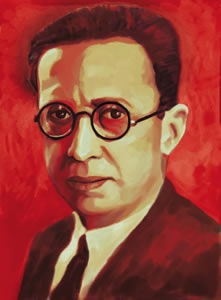
Manuel Bandeira (19 april 1886 13 oktober 1968)
De Zuidtiroolse dichter norbert c.
kaser werd geboren op 19 april 1947 in Brixen. Zie ook alle tags voor norbert c. kaser op dit
blog.
der hahn
wenn der hahn sich
erhebt
an jedem morgen
seinen kamm neu
stellt
rot voller blut und
fleisch
da werfe ich ihm
steine nach
an jedem morgen
dem hahn in
seine federn
wenn der hahn sich erhebt
an jedem abend
seinen kamm noch
stellt
wo er doch schlafen
soll
da werfe ich ihm
sand ins lid
an jedem abend
dem hahn daß
er schlafe
drohung
ob faust
oder erhobener
zeigefinger
die geste bleibt
gleich
solange du die hand
nicht auftust
laß fallen
die drohung
den inhalt deiner
hand
leere haende sind
voll guter dinge
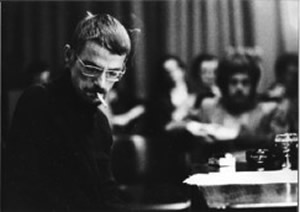
n. c. kaser
(19 april 1947 21 augustus 1978)
De Russische schrijver Veniamin
Kaverin werd geboren op 19 april 1902 in Pskov. Zie ook alle tags voor Veniamin Kaverin op dit
blog.
Uit:
Two captains (Vertaald
door Bernard Isaacs)
And he started to swear.
Had I
known what was to happen within the hour, I should have tried to remember what he said, although just the same I
could not have repeated his words to anybody. He went on swearing for quite
a time, and even spat in the fire and gnashed his teeth. Then
he fell silent, his head thrown back and knees clasped in his hands. I
stole a glance at him and could
have felt sorry for him had he not been so unpleasant.
Suddenly the man sprang to
his feet. In a few
minutes he was on the pontoon bridge,
which the soldiers had recently put
across the river, and I caught a last glimpse
of him on the opposite bank before he disappeared.
My
fire had
gone out, but even without it I could see clearly that there wasn't a single blue crab among my
catch, and a pretty good catch it was. Just ordinary black crabs, none too big
either-they went for a kopeck a pair at the local pub.
A cold wind began to
draw from somewhere
behind me. My trousers billowed out and I began to feel cold. It was time to go home. I was
casting my line, baited with meat, for the last time when I
saw the watchman on the opposite bank running down the slope. Spassky Tower
stood high above the river and the
hillside leading down to the
river bank was littered with stones. There was no sign of anybody on the hillside, which was lit up brightly by the moon, yet for some reason the watchman unslung this
rifle as he ran.
"Halt!"
He
did not fire, but just clicked the bolt,
and, at that very moment I saw the man he was
after on the pontoon bridge. I am
choosing my words carefully, because even now I am not quite
certain it was the man, who, an hour ago, had been sitting by my
fire. But I can still see the scene before my eyes: the quiet
banks, the widening moon path on the water
running straight from where I
was to the barges of the pontoon bridge, and on the bridge the long shadows of two running figures.
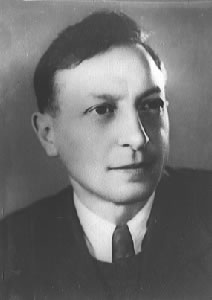
Veniamin Kaverin (19 april 1902 4 mei 1989)
De Franse dichter en schrijver van liedteksten Pierre-Jean de
Béranger werd geboren op 19 april 1780 in Parijs. Zie ook alle tags voor Pierre-Jean de Béranger op
dit blog.
LA BACCHANTE
Air : Fournissez un canal au ruisseau
Cher amant, je cède
à tes désirs :
De champagne enivre Julie.
Inventons, sil se peut, des plaisirs ;
Des Amours épuisons la folie.
Verse-moi ce joyeux poison ;
Mais sur-tout bois à ta maîtresse :
Je rougirais de mon ivresse,
Si tu conservais ta raison.
Vois déjà briller dans mes regards
Tout le feu dont mon sang bouillonne.
Sur ton lit, de mes cheveux épars,
Fleur à fleur vois tomber ma couronne.
Le cristal vient de se briser :
Dieux ! Baise ma gorge brûlante,
Et taris lécume enivrante
Dont tu te plais à larroser.
Verse encor ! mais pourquoi ces atours
Entre tes baisers et mes charmes ?
Romps ces nuds, oui, romps-les pour toujours :
Ma pudeur ne connaît plus dalarmes.
Presse en tes bras mes charmes nus.
Ah ! je sens redoubler mon être !
À lardeur quen moi tu fais naître
Ton ardeur ne suffira plus.
Dans mes bras tombe enfin à ton tour :
Mais, hélas ! tes baisers languissent.
Ne bois plus, et garde à mon amour
Ce nectar où tes feux samortissent.
De mes désirs mal apaisés,
Ingrat, si tu pouvais te plaindre,
Jaurai du moins pour les éteindre
Le vin où je les ai puisés.
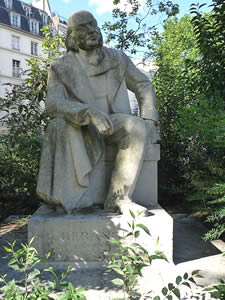
Pierre-Jean de Béranger (19 april 1780 16 juli
1857)
Standbeeld in Parijs
De Franse
schrijver Louis Amédée Achard werd geboren op 19 april 1814 in
Marseille Zie ook alle tags voor Louis Amédée Achard op dit blog.
Uit: Madame Rose
Georges était arrivé à la Maison-Blanche vers
la fin d'avril avec Pétronille, Jacob et Tambour. Trois ou quatre grandes
caisses remplies de livres l'avaient suivi; il avait acheté un canot, un fusil,
des vareuses, tout cet attirail de chasse et de pêche sans lequel les jours à
la campagne peuvent paraître longs, même les jours d'hiver, et bientôt on avait
vu s'élever dans le bûcher une pile de bois propre à braver les neiges de
décembre et les pluies de janvier.
On sait qu'à Paris un changement de domicile
met dans les relations des barrières plus infranchissables que n'en mettait
jadis entre les Capulet et les Montaigu la haine héréditaire de deux familles:
en partant pour la campagne, Georges était donc parti pour l'exil. Deux ou
trois de ses amis se souvenaient seuls qu'il habitait Maisons. Il vivait avec
Tambour et causait avec ses livres. Ses habitudes étaient les plus régulières
du monde; il ne savait jamais la veille ce qu'il ferait le lendemain. Il se
couchait tard ou tôt, selon le temps, un jour avec le soleil, et le jour
d'après avec la lune. S'il partait avec l'intention de lire dans quelque coin
du bois, on le surprenait ramant sur la Seine avec l'ardeur inquiète d'un
contrebandier. Il déjeunait tantôt chez lui, tantôt à l'auberge, ce qui, pour
le dire en passant, faisait le désespoir de Pétronille, obligée de l'attendre
auprès d'une côtelette qui noircissait sur le gril.
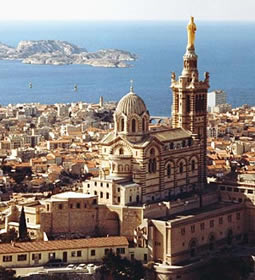
Louis Amédée Achard (19 april 1814 24 maart
1875)
Marseille
Onafhankelijk
van geboortedata:
De Zwitserse
schrijver Werner Rohner werd in 1975 geboren in Zürich. Zie ook alle tags voor Werner Rohner op dit blog.
Uit: Lektionen im Größenwahn
Einmal, auf einer nicht ganz legalen
Substanz, habe ich sogar geglaubt, ich sei Jesus. Ich fand das sehr romantisch,
und vielleicht ginge es der Welt besser, wenn mehr Menschen glauben würden, sie
seien Jesus. Andererseits, gäbe es wirklich mehrere Jesus (im Zeitalter des
Klonens und der großen Anzahl gut erhaltener Jesushaare ist das gar nicht so
unwahrscheinlich), so wäre es nicht auszuschließen, dass sie sich bloß
gegenseitig taub predigen, die Schuld aus den Schuhen schieben oder gar
bekriegen würden, wie man das von anderen Größenwahnsinnigen kennt. Aber genau
um diesen Größenwahn geht es: Er ist unabdingbar fürs Schreiben. Man muss sich
schon selbst Flügel verleihen, wenn man fliegen will. (Und wenn sie gegen innen
wachsen, legt man sich einfach auf die Erdstrahlung, denn auch die trägt das
habe ich letzthin geträumt und man muss nicht mehr albern mit den Armen
flattern.) Den einen oder anderen Absturz wird man zwar nicht überleben (zum
Beispiel, wenn man plötzlich nicht mehr unterscheiden kann zwischen dem
Geschriebenen und der Erinnerung; oder wenn man Jahre an einem Manuskript arbeitet,
um es am Ende nicht einmal mehr gut genug für die Schublade zu finden), aber
für Kinder Gottes sollte das mit der Auferstehung kein allzu großes Problem
darstellen. (Und es ist ja kein Geheimnis, dass Gott die Welt nach Jesus' Tod
den Schriftstellern überlassen hat, seinen eigentlichen Söhnen und Töchtern.)
Und auch Jesus ist doch nur so bekannt, weil er sich nach der Krise am Kreuz
wieder aufgerappelt hat. Weil er glaubte, es würde ihm sein Leiden erleichtern,
wenn er es teilen, mitteilen könnte, damit die Menschen begreifen, wie schwer
er wirklich trägt; er war einfach sehr einsam. Einsamkeit und Größenwahn. Und
vielleicht noch die Welt (mit der eigenen Erfindung) verändern wollen und
glauben, man richte damit nicht nur
Schaden an. Das sind nicht die schlechtesten Voraussetzungen zum Schreiben.
Wenn man sich nicht selbst zum Gott erklärt, tut es niemand.

Werner Rohner (Zürich, 1975)
|



